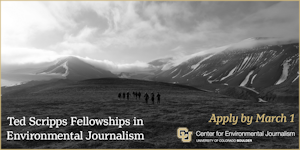SEJournal Online is the digital news magazine of the Society of Environmental Journalists. Learn more about SEJournal Online, including submission, subscription and advertising information.
 |
SEJournal is the weekly digital news magazine of the Society of Environmental Journalists. SEJ members are automatically subscribed. Nonmembers may subscribe using the link below. Send questions, comments, story ideas, articles, news briefs and tips to Editor Adam Glenn at sejournaleditor@sej.org. Or contact Glenn if you're interested in joining the SEJournal volunteer editorial staff.
==> NEW: Trump 2.0 EJWatch <==
TipSheet | Reporter's Toolbox | Backgrounders | WatchDog |
BookShelf | EJ Academy | EJ InSight | Voices of Environmental Justice |
Features | FEJ StoryLog | Freelance Files | Inside Story | SEJ News
About SEJournal Non-Members: Subscribe Now
-
Advertise in the digital SEJournal! Find advertising information and rates here.
(SEJ members: Advertise your recent book in the digital SEJournal — only $50.)























 Advertisement
Advertisement 



